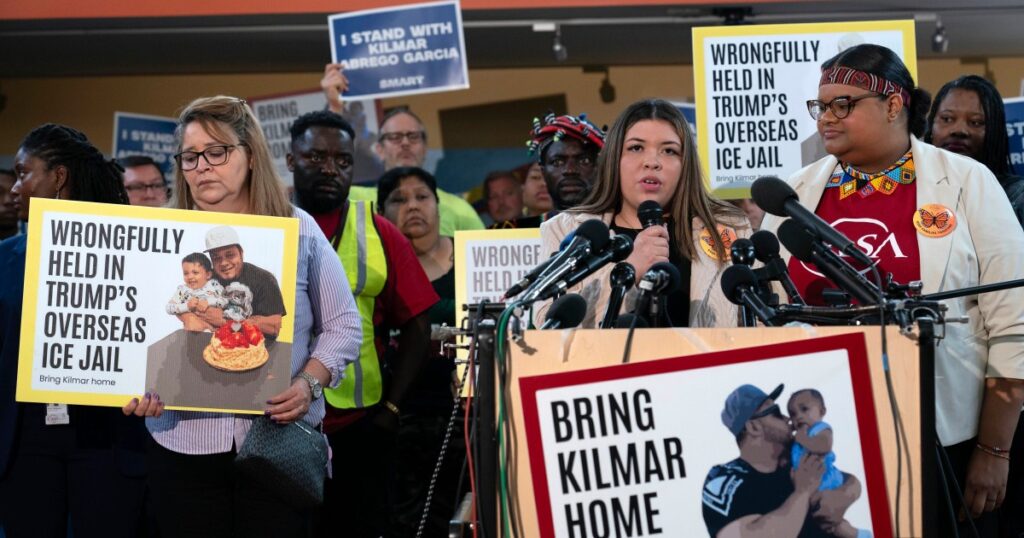President Donald Trump’s April 14 public meeting with El Salvador President Nayib Bukele centred on the mistaken deportation of Kilmar Armando Abrego Garcia.
Trump administration officials and Bukele said Abrego Garcia would not be returned to the US, four days after the US Supreme Court ruled that the Trump administration must facilitate Abrego Garcia’s return.
On March 15, the US government deported Abrego Garcia to CECOT, a Salvadoran mega-prison where Trump has sent hundreds of Salvadoran and Venezuelan men who were previously in the US. But Abrego Garcia had protection that was supposed to prevent him from being deported to El Salvador. The Justice Department called Abrego Garcia’s deportation an “oversight” and “an administrative error” in a court filing.
During the Oval Office meeting, Bukele and several Trump administration officials made misleading statements about Abrego Garcia’s case and the role the US and El Salvador’s governments are playing in his potential return.
Here are the facts.
Did courts rule Abrego Garcia an MS-13 member?
That’s what Attorney General Pam Bondi claimed. “In 2019, two courts, an immigration court and an appellate immigration court, ruled that (Abrego Garcia) was a member of MS-13,” she said at the White House.
This needs context. US Immigration and Customs Enforcement arrested Abrego Garcia in 2019 as he was looking for day labour outside a Home Depot store in Maryland. A police informant told police Abrego Garcia was an MS-13 member. Immigration judges denied Abrego Garcia bond, both initially and on appeal, citing the informant’s accusation.
In the initial denial, the judge said the determination of Abrego Garcia’s gang membership “appears to be trustworthy and is supported” by evidence from the Gang Field Interview Sheet which, in part, referenced the informant. Abrego Garcia’s lawyers have repeatedly said in court that the informant’s accusation was fabricated.
The immigration judges’ decision to deny bond is not equivalent to ruling that Abrego Garcia was a gang member, David Bier, associate director of immigration studies at the libertarian Cato Institute, said.
In immigration bond hearings, detainees have the burden of proof to show they are neither a flight risk nor a danger to the community. Abrego Garcia “failed to meet his burden to show that he was not a danger,” Bier said. That’s not the same as the government proving affirmatively that he was an MS-13 member.
“The immigration judge is only taking at face value any evidence that the government provides,” Bier said. “It is not assessing its underlying validity at that stage.”
Abrego Garcia later received an immigration protection called withholding of removal. Granting that protection required the Department of Homeland Security to decide Abrego Garcia was not “a danger to the security of the United States”, Bier said, citing US immigration law.
“The Trump administration did not appeal these determinations or the granting of withholding of removal,” Bier said. “So at that time, it did not consider him a threat and no new evidence has been presented since then.”
Simon Sandoval-Moshenberg, a lawyer for Abrego Garcia, said his client has “never been convicted of any crime, gang-related or otherwise”. Neither of the immigration court proceedings constitute a conviction, because they were not trials.
Did MS-13’s ‘terrorist’ label justify Abrego Garcia’s expulsion?
“When President Trump declared MS-13 to be a foreign terrorist organisation, that meant that (Abrego Garcia) was no longer eligible, under federal law … for any form of immigration relief in the United States,” White House Deputy Chief of Staff Stephen Miller said.
It’s inaccurate that the US government’s February designation of MS-13 as a foreign terrorist organisation automatically revoked Abrego Garcia’s protection from removal, Aaron Reichlin-Melnick, a senior fellow at the American Immigration Council, said.
People who are proven members of a terrorist organisation are ineligible for protection from removal. But in Abrego Garcia’s case, to revoke his protections, the US government “would have been required under law to reopen his immigration court proceedings and prove to the judge that he was a member of MS-13 and therefore no longer eligible for withholding”.
“The government certainly could have sought to prove that (Abrego Garcia) was not eligible for any form of immigration relief, but it did not do so,” Bier said.
Is Abrego Garcia a ‘terrorist’?
Asked by a journalist whether El Salvador would return Abrego Garcia to the US, the country’s President Nayib Bukele said doing so would be akin to “smuggling a terrorist into the United States”.
There is no evidence that Abrego Garcia is a terrorist. It’s unproven that Abrego Garcia is a member of MS-13 and therefore a terrorist after the gang’s foreign terrorist designation.
Abrego Garcia is being held in a Salvadoran prison at the US government’s request, not because he committed a crime in El Salvador, Reichlin-Melnick said. Therefore, Bukele could release Abrego Garcia and the US government could grant him humanitarian parole “as part of the court order requiring them to facilitate his return”, Reichlin-Melnick added.
Did the Trump administration win the Supreme Court case on Abrego Garcia?
Yes, according to Miller. “We won (the Supreme Court) case 9-0 and people like CNN are portraying it as a loss,” he said.
But that is misleading. On April 10, the Supreme Court ruled, in an unsigned order, that the US government had to “‘facilitate’ Abrego Garcia’s release from custody in El Salvador and ensure that his case is handled as it would have been had he not been improperly sent to El Salvador”.
The Supreme Court also asked the lower court to “clarify its directive, with due regard for the deference owed to the Executive Branch in the conduct of foreign affairs”. The lower court had ordered that the US “facilitate and effectuate” Abrego Garcia’s release.
On April 11, the federal judge said the US government had “failed to comply” with the court’s order and ordered the government to submit daily updates on Abrego Garcia’s location and what steps the government has taken to facilitate his return.
Louis Jacobson contributed to this report.
https://www.aljazeera.com/news/2025/4/15/did-us-courts-back-kilmar-abrego-garcias-el-salvador-deportation?traffic_source=rss


